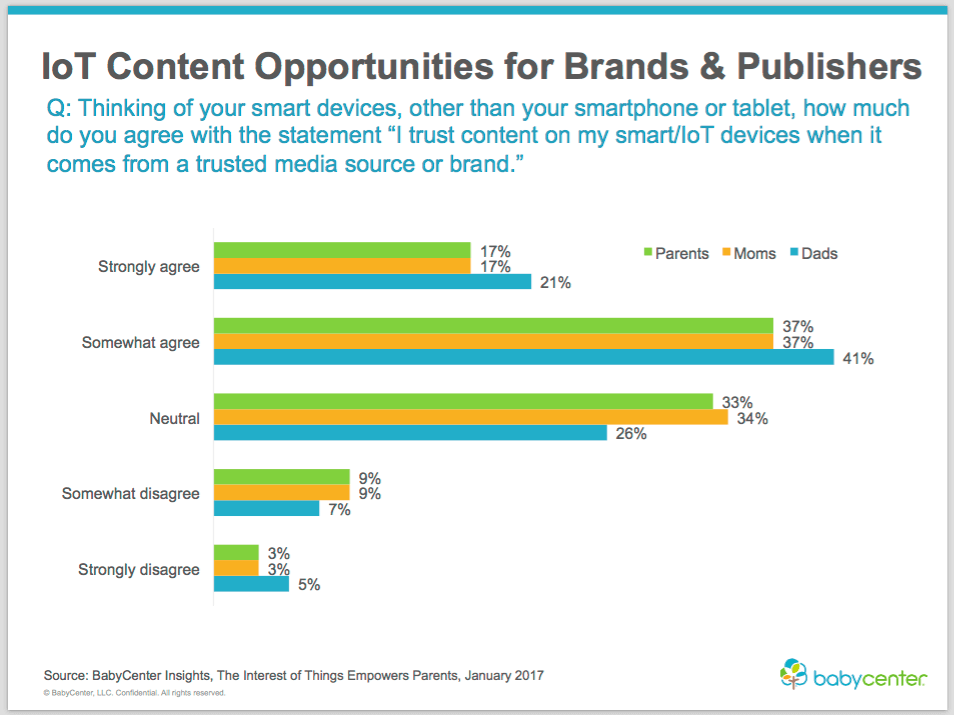Report: Parents like the Internet of Things
Parenting site BabyCenter says parents find that sensors and connectivity in the devices/objects they use save time, provide control, and add security.
Parenting website BabyCenter today released a new report that found the Internet of Things (IoT) has at least one consumer fan club: parents.
The study, “The Internet of Things Empowers Parents,” says that 70 percent of parents in the US now own an IoT device, 37 percent who own one want to buy another, and more than a third believe these gadgets make them better parents. And the report points to a potential major marketing opportunity for companies pitching parents.
Although there are many definitions of the IoT, generally speaking, it describes built-in sensors and online connectivity in devices and objects that don’t generally have them.
This report takes an expansive view of products falling into that category and includes “Amazon Dash buttons, baby health tracking devices, connected cars, health/fitness tracking devices, Internet-connected TV devices, smart baby/children’s toys, smart home/home security devices, smart kitchen appliances, smart nursery/baby gear, smart speakers with virtual assistants enabled, smart TVs, and smart watches.”
A new member of the IoT club is the intelligent agent, including Apple’s Siri, Microsoft’s Cortana, Amazon’s Alexa, and the Google Assistant. The report points out that mothers’ ownership of intelligent agents through smart speakers, such as Amazon Echo or Google Home, has doubled in the last six months.
“Even though the devices [with intelligent voice agents] are not parenting-focused per se, that connectedness becomes an important part of their parenting skill set,” BabyCenter Head of Global Sales Julie Michaelson told me via email. “When asked how their IoT device makes them feel, they used words including organized, efficient, useful, smart, confident and supported.”
She said her “favorite finding [from the report] is that over half of the people using voice-enabled technology say ‘thank you’ to the gadget,” adding she has “definitely done that.”
The new BabyCenter findings follow an Interactive Advertising Bureau report last month which found that IoT owners are likely to be parents, aged 18 to 34, with college educations and annual incomes above the national average of $50,000.
Parents, among the most practical of beings, like IoT devices for such reasons as saving time (36 percent), having more control (29 percent), and safety/security (23 percent). Fathers are more likely to say they purchased such a device to save money or for security/safety than mothers are.
Marketers will be especially interested in the finding that a substantial portion of the responding parents are receptive to personalized experiences that are based on data collected through IoT devices.
Additionally, slightly more than half of the parents surveyed said they have “a greater confidence” in content found through such devices if the brand is trusted, and about a quarter were interested in IoT-filtered product recommendations or tailored content. However, the report gives no indication of parents’ concerns about privacy, consent or content that is inappropriate for their children.
Michaelson told me that her company has found in other surveys “that half of parents who own IoT are concerned about privacy issues when it comes to their devices, [while this study] focused on how parents use IoT and benefit from technology.” This is BabyCenter’s first report on the subject, although it has been tracking how mothers access and consume content since 2011.
The study, conducted at the end of last year through an online survey, queried 1,359 parents (230 dads and 1,129 mothers), aged 18 to 44.
Marketing Land – Internet Marketing News, Strategies & Tips
(16)






